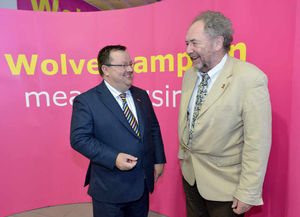Wolverhampton school-leavers 'lack skills to find work'
A lack of skills among jobseekers and young people leaving school unprepared for the world of work are among the problems highlighted in a new report.

And it has found local people are missing out on some of the new jobs being created in and around the city.
A year-long study by the city's Skills & Employment Commission found problems with the quality of careers advice at many schools, while the local network of skills training providers and courses was described as 'muddled and complicated', with gaps and overlapping services.
It also found Wolverhampton residents are not competing as successfully as they might be for employment opportunities in the city and beyond.
And its lower than average skills meant 20,000 people in the city's working population would need to get a qualification for the city to reach the average level for England.
But it also found that the so-called 'third sector' of voluntary organisations and not-for-profit businesses was providing a valuable stepping stone back into work for many long-term unemployed.
Professor Tony Travers from the London School of Economics, who chaired the commissions, said: "There are probably too many organisations and too much complexity.
"This is not the fault of the council, but can more fairly be blamed on central government's many short-term initiatives, particularly in the field of skills, employment, further education and training.
And he said: "The commission's report is not a plea for more money, but rather for the better use of existing resources.
"Central government should transfer more skills and training programmes to the city or city regional level, so as to ensure rational use of public money.
"Employers must expand their role in providing apprenticeships and schemes which allow young people to learn about the world of work.
"The city council needs to make it welcoming and easy for businesses to move into Wolverhampton. It must also ensure city centre is attractive and vibrant.
"None of this can be achieved overnight. Some improvements can be made immediately, but others will take 10 or 20 years to have an effect. The sooner change starts, the earlier Wolverhampton can."
The report was carried out for the City Board, the group made up of senior business figures and local authority representative, and Wolverhampton council, which is now drawing up an action plan to put the findings into effect.
Prof Travers placed much of the responsibility for tackling the skills problem on the shoulders of the council. He said: "The city council has the resources and legitimacy needed, not to do everything, but to lead things."
His commission colleague Professor Anne Green, from the University of Warwick, called for: "An improved, joined-up approach to careers advice for people of all ages."
And both the council and City Board needed to work with employers to help them improve the skills of their existing workers, showcasing the success stories at a 'Wolverhampton Awards' event.
The report also called on the city to work closely with both the Local Enterprise Partnership – the joint business and local authority body covering the whole Black Country – and with the proposed new West Midlands Combined Authority.
There was also a need for improved communication and collaboration with employers, and for improved use of resources and clearer roles across institutions and organisations involved in education, training and skills development.
The report was unveiled following a breakfast event attended by around 200 people from local companies and business organisations aimed at raising the profile of Wolverhampton as a centre for business investment.
Held at the GTG training centre at Wednesfield and hosted by journalist Declan Curry, the former face of business on BBC's breakfast show, the event was told of the need to improve Wolverhampton's image on the national stage.

Prof Tony Travers said, despite its problems with low skill levels among local people, Wolverhampton had "a powerful, multi-billion pound economy."
And he argued that a city's image could changed by a strong marketing campaign, pointing to Glasgow as a successful example.
During a question & answer session during the breakfast event, Henry Carver, head of the Carvers builders merchants business, urged the council to demolish derelict buildings in the city centre to make the area more attractive to potential investors.
Both events were organised as part of the City's Business Week, which is aimed at boosting investment in the city.




